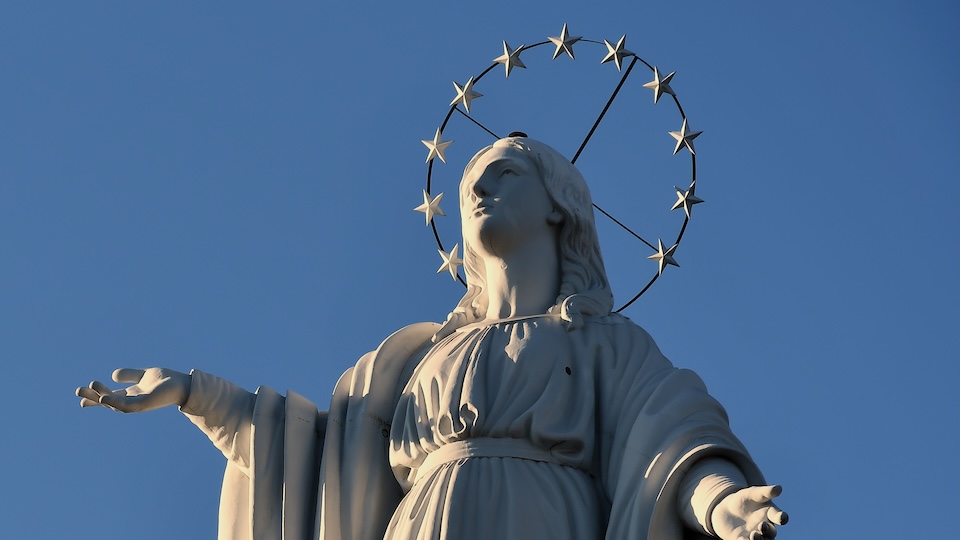

"All generations will call me Blessed" | Reflection for Advent III
Matthew Neugebauer
Saturday, December 16, 2023

“In perfect love this law holds: that the lover become like the one he loves.”While the Council Fathers at Ephesus reflected on the mystery of the Incarnation, they were led inevitably to this paradox: the God of eternity has a human mother, and her name is Mary. Mary of Nazareth hasn't simply "left a legacy" or "made a mark." In her humility, she won’t boast in her own actions, her own choices. Nevertheless, we call her “blessed,” because her participation in God's saving plan has decisively changed humanity forever. She was offered a unique role in God's saving union with humanity and with creation: to give God his human face, and his human life. To that offer, she simply said, “Here am I, the servant of the Lord; let it be with me according to your word” (v. 38). “All generations will call me blessed.” As we know, the Spirit of God has ensured that this exclamation of the Mother of God would come true. Thanksgiving for Mary's unique role began with the Scriptural origins of the Church, such as in the accounts of her and the Beloved Disciple at the foot of the cross (John 19:26), her presence with the Apostles after the Ascension and at Pentecost (Acts 1:14), the image of the crowned woman in Revelation 12:1, and, indeed, St. Luke's intentional inclusion of her Song of Praise in his Gospel account. On this Third Sunday of Advent, portions of this Song of Mary – known as the Magnificat for its opening word in Latin – take the place usually given to a Psalm of David. For much of the history of the Western Church, the Magnificat has found its place on the lips of clergy and religious in their daily recitation of Vespers or Evening Prayer. It's had a particular influence in the English-speaking world, since it forms the centrepiece of the Anglican service of Evensong. That service, so prevalent throughout the modern era and now part of the Roman Catholic liturgical family through the Ordinariates, has received its fair share of magnificent choral settings over the last few centuries. Here’s an early example of a setting by William Byrd, a distinctive composer who navigated both sides of the English Reformation: From the moment that Mary of Nazareth uttered her Song of Praise to today, all generations have truly called her "Blessed."
Related Articles:
Category: Advent and Christmas, General Posts, Mary, Reflections, Saints and Blesseds
Tag: Advent, Blessed Virgin Mary, Magnificat, Third Sunday of Advent
Homily of Pope Leo XIV at the Mass for the Jubilee of Families, Children, Grandparents, and the Elderly
Sunday, June 1, 2025
 Pope Leo XIV
Pope Leo XIV
Pope Leo XIV celebrated Mass for the Jubilee of Families, Children, Grandparents, and the Elderly and referred to Pope Francis and mentioned spouses who have been beatified and canonized, like the parents of St. Therese of the Child Jesus.
Looking back on Rerum Novarum
Monday, May 26, 2025
 Matthew Neugebauer
Matthew Neugebauer
Pope Leo XIV chose his name primarily to highlight his most recent namesake Leo XIII, whose "historic encyclical Rerum Novarum addressed the social question" to the challenges of his time. What concerns does the encyclical address? How does it speak to its time? And what has been its legacy 134 years later?
Homily of Pope Leo XIV at the Mass and Installation on the Roman Cathedra
Sunday, May 25, 2025
 Pope Leo XIV
Pope Leo XIV
On May 25, 2025, Pope Leo XIV was formally installed on the cathedra of the Diocese of Rome at a Mass in St. John Lateran Basilica. In his homily, he said that "communion is built primarily 'on our knees,' through prayer and constant commitment to conversion."
St. John Lateran: The Pope’s Cathedral
Friday, May 23, 2025
 Matthew Neugebauer
Matthew Neugebauer
Did you know that the pope has his own cathedral? Pope Leo XIV is about to "take possession" of the Lateran Basilica, which you can read all about here.
Homily of Pope Leo XIV at the Inaugural Mass
Sunday, May 18, 2025
 Pope Leo XIV
Pope Leo XIV
On May 18, 2025, Pope Leo XIV inaugurated his pontificate with Holy Mass in St. Peter's Square. In his homily, he said, "I come to you as a brother, who desires to be the servant of your faith and your joy, walking with you on the path of God’s love, for he wants us all to be united in one family."
SUPPORT LABEL
$50
$100
$150
$250
OTHER AMOUNT
DONATE










